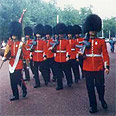
Brits took to Sudoku first. Do Beefeaters play it in time off?
צילום: רינת ולדמן
'Relief from bigger puzzles'
Professor's take on Sudoku craze: Solving little puzzles make us feel relief from big ones we can't solve
LONDON - Britain has a new addiction.
Hunched over newspapers on crowded subway trains, sneaking secret peeks in the office, a puzzle-crazy nation is trying to slot numbers into small checkerboard grids.
It's sudoku - a sort of crossword without words that has consumed the country.
"There's something about that grid with its empty squares - it's just crying out to be filled in," said Wayne Gould, a retired judge and puzzle aficionado who helped spark Britain's love affair with the game.
A Japanese brainteaser that has quietly appeared in puzzle magazines in Asia and North America for years, sudoku hit Britain in the pages of the Times newspaper in November. It now has thousands of avid followers, a host of Web sites and books, and runs daily in eight national newspapers, which compete fiercely to offer their readers the best puzzle.
The Independent offers four a day, of varying levels of difficulty. The Guardian boasts that its puzzle is "hand-crafted by its Japanese inventors," rather than spawned by a computer like the others. The Times is offering a version for mobile phones. The Daily Telegraph promises a 3-D "ultimate sudoku" version.
Already in the lexicon
The name, which translates roughly as "the number that is alone," has become a handy catch-phrase. A Times columnist wrote dismissively about Prime Minister Tony Blair's recent Cabinet shuffle: "It is not exactly sudoku, is it?"
Sudoku consists of a grid of nine rows of nine boxes, which must be filled in so the numbers one through nine appear just once in each column, row and three-by-three square.
It looks like arithmetic, but requires the application of logic. It can be fairly straightforward or fiendishly difficult.
"I think the attraction is that you can definitely get it right," said Anton Viesel, a 23-year-old London bookseller. "It's very satisfying."
But alongside the joy of sudoku success comes the frustration of failure. Web sites ring with the cries of the addicted.
"I have got a stiff neck from sitting hunched over, a headache from concentrating too long and the house is covered in the bits of rubber you get" when erasing, sudoku sufferer Amanda Masterman wrote on one Web site.
Variation on 'Latin squares'
While its name is Japanese, sudoku is a variation on Latin squares, developed in the 18th century by Swiss mathematician Leonhard Euler as a variation on an older puzzle, magic squares. Marcel Danesi, a professor of semiotics at the University of Toronto and author of "The Puzzle Instinct," said magic squares can in turn be traced to lo shu, an ancient Chinese puzzle.
Japanese publisher Nikoli Inc. claims to have introduced the puzzle to Japan in the 1980s from the United States, where it was called "number place." It is featured in a variety of Japanese magazines and books, but lacks the public profile it has achieved in Britain, where it has been discussed on daytime talk shows and evening news programs.
The British boom can be traced to Gould, a New Zealander who discovered sudoku on a visit to Tokyo in 1997. He created a computer program that generates the puzzles, then offered them for free to the Times. He now supplies puzzles to newspapers in a dozen countries, including the United States.
Sudoku's success in Britain is partly due to fierce newspaper competition, and partly to a deeply ingrained puzzle-solving habit in this nation of Scrabble-lovers and cryptic-crossword addicts.
Brits like puzzles
"I think there's something in the British personality - they like their puzzles hard," said the 59-year-old Gould.
Some argue that sudoku fever will fade once newspapers lose interest. Danesi says the puzzle - like past sensations such as 1980s icon Rubik's Cube - is likely to retain a strong following even when it has faded from the headlines.
He says it is one of the classic puzzle types, enduring mind-benders whose appeal runs deep.
"It seems to be part of the human system of everyday life to do puzzles," Danesi said. "In a small, minuscule way, solving a puzzle gives us relief from the larger philosophical puzzles."










